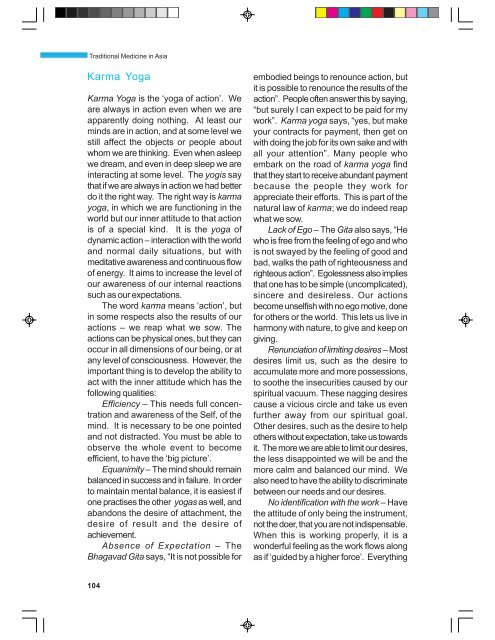Traditional Medicine in Asia
Traditional Medicine in Asia
Traditional Medicine in Asia
You also want an ePaper? Increase the reach of your titles
YUMPU automatically turns print PDFs into web optimized ePapers that Google loves.
<strong>Traditional</strong> <strong>Medic<strong>in</strong>e</strong> <strong>in</strong> <strong>Asia</strong><br />
Karma Yoga<br />
Karma Yoga is the ‘yoga of action’. We<br />
are always <strong>in</strong> action even when we are<br />
apparently do<strong>in</strong>g noth<strong>in</strong>g. At least our<br />
m<strong>in</strong>ds are <strong>in</strong> action, and at some level we<br />
still affect the objects or people about<br />
whom we are th<strong>in</strong>k<strong>in</strong>g. Even when asleep<br />
we dream, and even <strong>in</strong> deep sleep we are<br />
<strong>in</strong>teract<strong>in</strong>g at some level. The yogis say<br />
that if we are always <strong>in</strong> action we had better<br />
do it the right way. The right way is karma<br />
yoga, <strong>in</strong> which we are function<strong>in</strong>g <strong>in</strong> the<br />
world but our <strong>in</strong>ner attitude to that action<br />
is of a special k<strong>in</strong>d. It is the yoga of<br />
dynamic action – <strong>in</strong>teraction with the world<br />
and normal daily situations, but with<br />
meditative awareness and cont<strong>in</strong>uous flow<br />
of energy. It aims to <strong>in</strong>crease the level of<br />
our awareness of our <strong>in</strong>ternal reactions<br />
such as our expectations.<br />
The word karma means ‘action’, but<br />
<strong>in</strong> some respects also the results of our<br />
actions – we reap what we sow. The<br />
actions can be physical ones, but they can<br />
occur <strong>in</strong> all dimensions of our be<strong>in</strong>g, or at<br />
any level of consciousness. However, the<br />
important th<strong>in</strong>g is to develop the ability to<br />
act with the <strong>in</strong>ner attitude which has the<br />
follow<strong>in</strong>g qualities:<br />
Efficiency – This needs full concentration<br />
and awareness of the Self, of the<br />
m<strong>in</strong>d. It is necessary to be one po<strong>in</strong>ted<br />
and not distracted. You must be able to<br />
observe the whole event to become<br />
efficient, to have the ‘big picture’.<br />
Equanimity – The m<strong>in</strong>d should rema<strong>in</strong><br />
balanced <strong>in</strong> success and <strong>in</strong> failure. In order<br />
to ma<strong>in</strong>ta<strong>in</strong> mental balance, it is easiest if<br />
one practises the other yogas as well, and<br />
abandons the desire of attachment, the<br />
desire of result and the desire of<br />
achievement.<br />
Absence of Expectation – The<br />
Bhagavad Gita says, “It is not possible for<br />
104<br />
embodied be<strong>in</strong>gs to renounce action, but<br />
it is possible to renounce the results of the<br />
action”. People often answer this by say<strong>in</strong>g,<br />
“but surely I can expect to be paid for my<br />
work”. Karma yoga says, “yes, but make<br />
your contracts for payment, then get on<br />
with do<strong>in</strong>g the job for its own sake and with<br />
all your attention”. Many people who<br />
embark on the road of karma yoga f<strong>in</strong>d<br />
that they start to receive abundant payment<br />
because the people they work for<br />
appreciate their efforts. This is part of the<br />
natural law of karma; we do <strong>in</strong>deed reap<br />
what we sow.<br />
Lack of Ego – The Gita also says, “He<br />
who is free from the feel<strong>in</strong>g of ego and who<br />
is not swayed by the feel<strong>in</strong>g of good and<br />
bad, walks the path of righteousness and<br />
righteous action”. Egolessness also implies<br />
that one has to be simple (uncomplicated),<br />
s<strong>in</strong>cere and desireless. Our actions<br />
become unselfish with no ego motive, done<br />
for others or the world. This lets us live <strong>in</strong><br />
harmony with nature, to give and keep on<br />
giv<strong>in</strong>g.<br />
Renunciation of limit<strong>in</strong>g desires – Most<br />
desires limit us, such as the desire to<br />
accumulate more and more possessions,<br />
to soothe the <strong>in</strong>securities caused by our<br />
spiritual vacuum. These nagg<strong>in</strong>g desires<br />
cause a vicious circle and take us even<br />
further away from our spiritual goal.<br />
Other desires, such as the desire to help<br />
others without expectation, take us towards<br />
it. The more we are able to limit our desires,<br />
the less disappo<strong>in</strong>ted we will be and the<br />
more calm and balanced our m<strong>in</strong>d. We<br />
also need to have the ability to discrim<strong>in</strong>ate<br />
between our needs and our desires.<br />
No identification with the work – Have<br />
the attitude of only be<strong>in</strong>g the <strong>in</strong>strument,<br />
not the doer, that you are not <strong>in</strong>dispensable.<br />
When this is work<strong>in</strong>g properly, it is a<br />
wonderful feel<strong>in</strong>g as the work flows along<br />
as if ‘guided by a higher force’. Everyth<strong>in</strong>g









